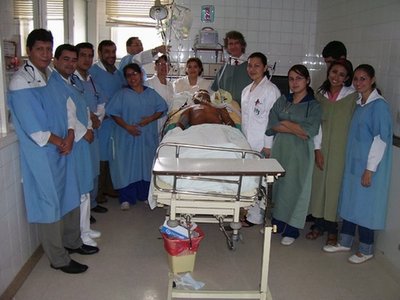October 15, 2009
Economic stimulus awards top $100 million, include funds for work in Latin America and with Native Americans
By Mary Guiden and Catherine O’Donnell
News & Information
The UW has passed the $100 million mark in economic stimulus awards.
As of Oct. 11, the University had received 325 awards totaling almost $141 million.
Grant awards began this past spring, after President Barack Obama signed the American Recovery and Reinvestment Act.
Several awards are tied to projects with global or multicultural reach, including $170,000 for Dr. Randall Chesnut’s traumatic brain injury research in Latin America. Chesnut, a professor of neurological surgery, has been conducting such research in the developing world for two decades.
His work has two main components, including a prospective seven-center study of outcomes of severe TBI in Argentina, Bolivia, Colombia, Brazil and Ecuador. Chesnut and his team are also examining the use of intracranial pressure monitoring in patients with severe TBI in Bolivia and Ecuador.
“Intracranial pressure is important in the realm of head injuries,” Chesnut said. “Despite the fact that it’s widely done, no one’s ever conducted fundamental research on the applicability. We can’t study it in the U.S. because it’s been so widely adopted. But no one in Bolivia has used it.”
Grant monies awarded to Chesnut will help fund colleagues in the U.S. to work as liaisons between the UW research team and study hospitals in Latin America. Researchers will learn how to conduct the studies and may also receive additional health care training.
Work in Latin America has helped educate Chesnut. “I went down there initially to teach and give lectures,” he said. “Then I learned I couldn’t really teach the people until I understood their reality or ‘realidad,’ as they call it. I met some very hard-working, dedicated intensivists there and we formed the Latin American Brain Injury Consortium.” (Intensivists are physicians who specialize in the care of critically ill patients, typically in intensive care units.)
Chesnut fine-tuned the research and eventually secured funding from the National Institutes of Health. “There’s a lot of help we can give them,” he said “but none of the help is applicable until we understand how to integrate it into their system.”
Dr. Dedra Buchwald, UW professor of medicine, has also received economic stimulus money. She is well-known for her work as director of the Chronic Fatigue Clinic at Harborview Medical Center but has also worked for years on Native American health issues.
Buchwald is principal investigator on a five-year project aimed at increasing cancer education among American Indians and Alaska Natives in Washington, Wyoming, Alaska, Montana, Idaho, and North and South Dakota. The project is funded by the National Cancer Institute.
Buchwald recently received a stimulus award of $249,000 that will be used to update Cancer 101: A Cancer Education & Training Program for American Indians and Alaska Natives. More specifically, funds will be used to hire a health educator who will work with communities to update the guide.
Cancer 101 was developed by the Northwest Portland Area Indian Health Board, and includes information on cancer screening and early detection, cancer diagnosis and staging and cancer risk and risk reduction. Buchwald said the health educator will explore recent National Cancer Institute directives — genetic factors, for instance — to determine whether new sections should be added.
“We also want to go to the communities and ask what’s missing,” Buchwald said. Survivorship has become a big topic, thanks to leadership from the Lance Armstrong Foundation, and traditional healing may need to be added. “We want to learn what kinds of things would make this a better program.”

